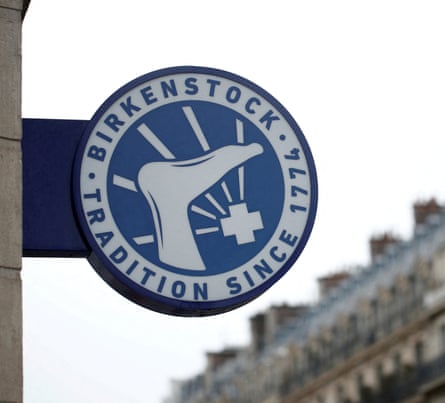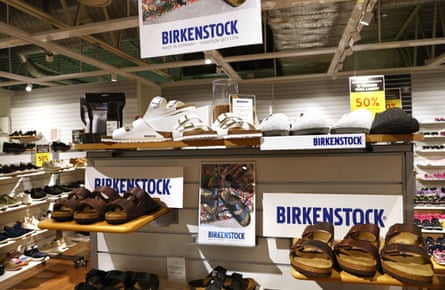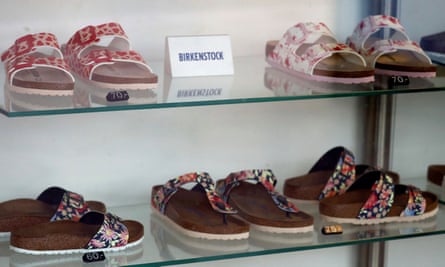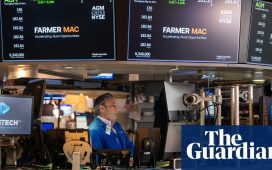It may be hard to believe but Birkenstocks were once seriously unfashionable, the go-to footwear of hippies willing to sacrifice style for arch support. Now those early adopters of frumpy sandal chic stand to be vindicated as the German shoemaker tries to bank its now mainstream appeal with a multibillion-pound listing.
But will this week’s flotation in New York – which if there is strong demand for its shares could value the 250-year-old orthopaedic shoe brand at almost £8bn – be a turning point for a reliable make that has been loved by those in the know for decades?
The glare of the stock market, with the pressure to achieve sales growth every quarter, is not always a comfortable place for private companies – even those with a long record of success. Other footwear makers such as Allbirds and Dr Martens have not fared well with recent flotations, so far proving a disappointment for investors.
In his pitch to would-be investors, Birkenstock’s chief executive, Oliver Reichert, who became the first non-family member to run it when he took the helm in 2013, says this is no ordinary shoe brand and they are getting a “generational opportunity” to buy a piece of the company.

With its footwear it has, Reichert says, been “shaping the zeitgeist for decades … stubborn in a positive sense, undeterred by fashion trends and proudly German”. He adds: “Birkenstock is more than a shoe. It’s a way of thinking, a way of living.”
Hyperbole aside, walking around in Birkenstock sandals that have moulded to your feet certainly fitted with the “way of living” ushered in by the coronavirus pandemic. During the crisis, interest in brands that offered comfort and heritage soared and remains strong. Workers are back in the office but dress codes are more relaxed than ever, with no raised eyebrows if your boss can see your toes rather than the shine of your shoes.
This relaxed mood helped Birkenstock shift 30m pairs last year, with sales up almost 30% to £1.1bn, resulting in a bottom line of £162m. If you like Birkenstocks, you like them, it seems. In its float brochure the company brags that people stick with it for decades, with a poll of US customers revealing that on average they own 3.6 pairs.
With a customer base that is 72% female, Birkenstock is also benefiting from a change in mindset among young women who no longer subscribe to high heels and delicate footwear as a feminine ideal. The company calls this the “breakthrough of modern feminism”, and that Margot Robbie wears a pair of its pink Arizona sandals at the end of Greta Gerwig’s knowing Barbie movie perhaps says it all.
Mind you, it also helps that its sandals are seen regularly on the feet of movie stars and models, including Kendall Jenner, Gigi Hadid and Kaia Gerber (the last two have even been seen out and about wearing them with socks).

Louise Déglise-Favre, a fashion analyst at the retail consultancy GlobalData, says that Birkenstock has managed to completely change its brand image from that of an orthopaedic shoe to a fashionable staple.
“Birkenstock has been able to turn the organic endorsements of models and celebrities into a lasting fashion trend, thanks to the quality and comfort of their products, as well as by expanding its range to more fashionable designs and colours while keeping its core aesthetic,” she adds.
While a successful listing would provide a symbol of success and legitimacy within the industry, the need to please a wider group of investors could lead to “dilution of brand identity”, she says.
Birkenstock has told investors it will price its shares somewhere between $44 and $49 a share, raising up to $1.6bn (£1.3bn) for the company and its private equity owner L Catterton, which is backed by the French luxury fashion house LVMH.
However, analysts warn that the shoemaker is taking the plunge in difficult market conditions, with investors worried about the economic backdrop and declining consumer confidence, as well as the poor performance of the initial public offerings by other footwear brands.
The outcome, which is expected to be announced on Wednesday, will be another milestone for the company founded in 1774 by Johann Birkenstock, a cobbler, to make orthopaedic shoes. The company had remained in the hands of the founding family until 2021, when it sold a majority stake to L Catterton.
So what is the big plan? More of the same, according to Reichert. Its five main styles: the Arizona, Madrid, Gizeh and Mayari sandals, plus the Boston clog make up the lion’s share of sales and it plans to stick to reinventing them each season in new colours and materials.
It is also aiming to become a shoe brand for all seasons, with more “closed-toe offerings”, not socks but clogs, trainers, shoes and boots that still utilise its proprietary footbed that reflects the anatomy of the foot. This push has already begun and seems to be working so far. After introducing more styles, including shearling-lined and waterproof versions, sales of the Boston clog have on average doubled every year since 2020.

Mamta Valechha, an equity research analyst at Quilter Cheviot, says its sandals have turned Birkenstock into a household name but this could make it harder to diversify.
“You want to continue to be known for that one, great-selling product but also bring in new lines to grow the business, and that can be hard,” she says. “If you look at other shoe retailer IPOs, recent history hasn’t been kind. It is a difficult market to IPO into.”
Reichert, however, is bullish. He says that when people say Birkenstock “is having a moment”, he always replies that “this moment has lasted for 250 years, and it will continue to last”.












